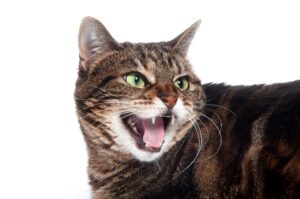Welcome to our blog at Kryder + Harr Veterinary Clinic. Today, we’re exploring a common yet often misunderstood behavior in cats: hissing. As pet owners, it’s natural to feel concerned when your cat displays signs of distress. This blog aims to provide insight into why cats hiss and what you can do about it. If you have concerns or need personalized advice for your pet, be sure to contact our team at our Granger, IN clinic at (574) 277-6533.

Unraveling the Reasons Behind Cat Hissing
It might seem obvious, even to people who don’t have cats, why cats hiss. We typically regard it as a warning from them to stay away. But there’s more to it than that, and there are multiple possible triggers for this behavior, which you can learn about below.
The Language of Hissing
Cats communicate in various ways, and hissing is a significant part of their language. It’s a sound that can signal fear, discomfort, pain, or a defensive attitude. Understanding the context of this behavior is essential to address it effectively.
Some common triggers/causes of hissing in cats include:
Fear and Anxiety
Cats often hiss when they feel threatened or scared. This could be due to a new environment, unfamiliar people, or other animals.
Pain or Discomfort
If a cat is in pain, it might hiss as a reaction to being touched or moved.
Territorial Behavior
Cats are deeply territorial animals, and they may hiss to defend their space from perceived intruders.
Play Aggression
Sometimes, cats will hiss during play as part of their natural hunting instincts.
Deciphering Your Cat’s Hissing
Does your cat seem to hiss more frequently than normal, or is this a common behavior from them that you’re trying to decode?
Observing and Understanding
To determine why your cat is hissing, observe their body language and the circumstances leading up to that behavior. Are there new pets or people in the house? Has your cat’s routine changed recently? Noting these factors can help you understand the root cause. Try paying close attention to other behaviors accompanying your cat’s hissing:
- Body Posture: Arched back, puffed fur, and flattened ears are signs of fear or aggression.
- Eating Habits: Changes in appetite can indicate stress or health issues.
- Litter Box Use: Irregularities here might signal a medical problem, such as a UTI.
Assessing the Level of Concern
While occasional hissing might not be alarming, consistent or intense hissing warrants attention. If your cat shows other signs of distress or changes in behavior, it’s time to consult a veterinarian. At Kryder + Harr Veterinary Clinic, we can help you identify and treat your cat’s underlying health issues.
Environmental Adjustments that Might Help Your Cat
Creating a calm and secure environment can reduce stress-related hissing in your cat. Consider these ideas:
- Safe Spaces: Provide hiding spots and quiet areas for your cat.
- Routine: Consistent feeding and playtimes can offer stability.
- Slow Introductions: Gradually introduce new pets or family members to your cat, so they can adjust at their own pace.
We Can Help with All Your Cat’s Health and Behavioral Issues
Hissing is a natural behavior for cats, but it can also indicate underlying issues in some cases. By observing and understanding the context of your cat’s hissing, you can better support their care and well-being. Our team at Kryder + Harr Veterinary Clinic in Granger, IN, is here to help you with any concerns you have. For more tailored advice or to schedule an appointment, call us at (574) 277-6533. We look forward to hearing from you!
Recent Posts
About Us
Welcome to Kryder & Harr Veterinary Clinic! Our animal hospital has been a fixture in the Granger community since 1981, practicing full-service veterinary medicine for all our pet parents and their furry family members. At KHVC, we pride ourselves on our history, of providing excellent customer service for our clients, along with dedicated, compassionate, and exceptional medical care for all of our patients.
